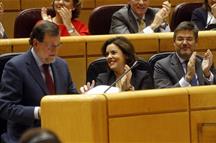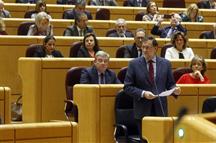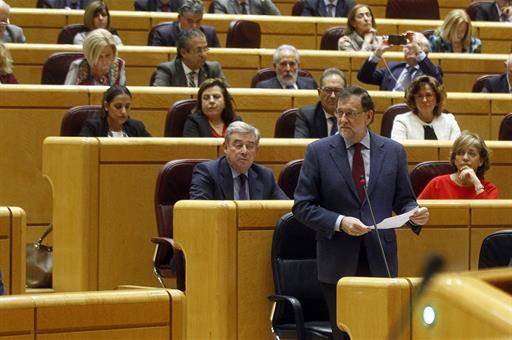Control session in Upper House
Mariano Rajoy advocates stepping up dialogue with Regional Government of Catalonia on "those issues of interest to citizens as a whole"
President's News - 2016.12.13
Upper House of Parliament, Madrid
In response to the Member of the Upper House, Josep Lluís Cleries, of the Mixed Group, who asked after the content of the "dialogue in the relations between Catalonia and Spain", Mariano Rajoy stated that those issues that the government may speak about with the Regional Government of Catalonia "are many and very important and interest and affect many people".
Among these "key issues", he highlighted the future of pensions, the education model and the fight against gender-based violence, as well as a series of questions that must be decided on shortly by Parliament, such as the ceiling on spending and the public authority deficit. Moreover, he recalled that the Conference of Regional Presidents will be held in January, at which the first steps will be taken towards a new model of regional financing and such issues as 'Brexit', European integration, key public services and the fight against fraud will be tackled.
The President of the Government also advocated dialogue on State investments in Catalonia, the decline in conflict between the two authorities, the 46 petitions proposed by the Regional Government of Catalonia and the issue of how "to avoid laws being passed that are in clear violation of the Constitution".
Mariano Rajoy highlighted that this dialogue led to results in the last term of office, as can be substantiated, for example, by the settlement of the debts of the Regional Government of Catalonia with its suppliers, investments in infrastructure and agreements on issues related to industry, tourism and culture. "What we need to do now is step up this dialogue", he said. In this regard, he pointed out that the Vice-President of the Government, Soraya Sáenz de Santamaría, has already spoken on several occasions with the Vice-President of the Regional Government of Catalonia, Oriol Junqueras.
The President of the Government reiterated that proposing to Parliament whether it will act "legally or illegally" on an issue on which only the people of Spain as a whole can decide upon "negates any form of negotiation because it amounts to a contract of adhesion". Mariano Rajoy advised Josep Lluís Cleries to distance himself from extremists and from those who "wish to do away with everything". "And if someone looks for a confrontation, they won't find me available, because what I am looking for is a consensus and I will work to that end", he stated,
Fight against fraud
 Pool Moncloa / J.M. CuadradoMariano Rajoy defended the government's actions and those of the Tax Agency in the fight against tax fraud and announced that the human and material resources available to this agency will be further increased. That was the response offered by the President of the Government to the Member of the Upper House for the PNV [Basque Nationalist Party], Jokin Bildarratz, who asked him about the resources to fight tax fraud by those owning large fortunes, including some sports stars.
Pool Moncloa / J.M. CuadradoMariano Rajoy defended the government's actions and those of the Tax Agency in the fight against tax fraud and announced that the human and material resources available to this agency will be further increased. That was the response offered by the President of the Government to the Member of the Upper House for the PNV [Basque Nationalist Party], Jokin Bildarratz, who asked him about the resources to fight tax fraud by those owning large fortunes, including some sports stars.
Mariano Rajoy pointed out that he is "totally and utterly convinced that the State Tax Agency will do whatever is in its hands to act against any taxpayers that do not meet their obligations, whether or not they are sportsmen". "Everyone must pay exactly what prevailing legislation dictates", he added.
The President of the Government confirmed that the government will persevere with its fiscal policy because the results coming through have been "quite simply the best ever in absolute terms: 50.45 billion euros in the period 2012-2015", and 7 billion in the year to date. However, he pointed out that if any legal amendments need to be made to improve effectiveness in the fight against fraud then he is prepared to implement them.
Mariano Rajoy announced that the government will increase controls to reduce fraud in such taxes as VAT and it will reduce the maximum limit on cash payments. He also said that the Tax Agency Plan for next year "will step up investigations into assets and income overseas, international taxation and the fight against tax havens".
Coordination of care policies
 Pool Moncloa / J.M. CuadradoIn response to the Member of the Upper House for the Socialist Group, Vicente Álvarez Areces, who enquired after the measures that the government intends to take to turn around the increase in inequality in Spain, Mariano Rajoy argued that more work must be done to create new jobs, increase revenue, improve social policies and public services.
Pool Moncloa / J.M. CuadradoIn response to the Member of the Upper House for the Socialist Group, Vicente Álvarez Areces, who enquired after the measures that the government intends to take to turn around the increase in inequality in Spain, Mariano Rajoy argued that more work must be done to create new jobs, increase revenue, improve social policies and public services.
To this end, the President of the Government claimed that it is "absolutely essential to coordinate care policies" between the different tiers of government: Central Government, the regional governments and the local authorities.
Mariano Rajoy argued that "inequality is not increasing in Spain", but rather that "this has started to be corrected", thanks to the economic policies pushed through by the government over recent years, which are based on three pillars: structural reforms, strong control over public spending and the establishment of priorities.
The President of the Government pointed out that after five years of negative economic growth - "the greatest recession in modern economic history" - we have now enjoyed three years of positive growth and job creation has risen, which is the key to reducing inequality. He also argued that Spain "is making better progress than the rest of the Eurozone" as regards figures on severe material poverty and stressed that the indices of households where all of its members are unemployed and people cannot reach the end of the month have improved.





